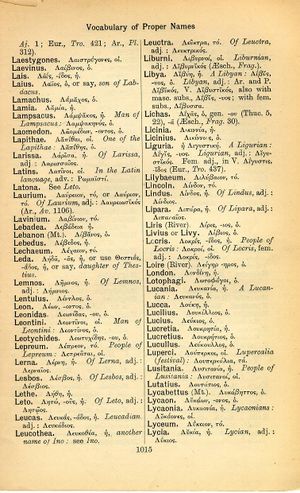Leda: Difference between revisions
ἀγεωμέτρητος μηδεὶς εἰσίτω → no one ignorant of geometry may enter, let no one ignorant of geometry enter, let no one ignorant of geometry come in
m (Text replacement - "}}]]" to "}}]]") |
m (Text replacement - "link={{" to "link={{") |
||
| Line 1: | Line 1: | ||
{{WoodhouseENELnames | {{WoodhouseENELnames | ||
|Text=[[File:woodhouse_1015.jpg|thumb | |Text=[[File:woodhouse_1015.jpg|thumb | ||
|link= | |link={{filepath:woodhouse_1015.jpg}}]][[Λήδα]], -ας, ἡ, or use Θεστιάς, -άδος, ἡ, or say, <b class="b2">daughter of Thestius.</b> | ||
}} | }} | ||
{{Lewis | {{Lewis | ||
Revision as of 10:09, 15 August 2017
English > Greek (Woodhouse)
Λήδα, -ας, ἡ, or use Θεστιάς, -άδος, ἡ, or say, daughter of Thestius.
Latin > English (Lewis & Short)
Lēda: ae, and Lēdē, ēs, f., = Λήδα,
I the daughter of Thestius, and wife of Tyndarus; she bore by Jupiter, who visited her in the form of a swan, two eggs, from one of which came Pollux and Helen, and from the other Castor and Clytemnestra, Ov. H. 17, 55; id. M. 6, 109; Hyg. Fab. 77: pueri Ledae, i. e. Castor and Pollux, Hor. C. 1, 12, 25.—She was deified after her death, under the name of Nemesis, Lact. 1, 21: Lede, Ov. Am. 1, 10, 3: chironomon Ledam saltare, i. e. in the part of Leda in a pantomime, Juv. 6, 63.—Hence,
II Lēdaeus, a, um, adj., of or belonging to Leda, Ledæan.
A Lit.: Ledaei dei, i. e. Castor and Pollux, Ov. F. 1, 706; also, Lacones, Mart. 1, 37, 2: Helena, Verg. A. 7, 364: Hermione (as granddaughter of Leda), id. ib. 3, 328: ovum, a swan's egg, Mart. 8, 33, 21; cf. olores, id. 1, 54, 8: Timavus, because Castor, on the return of the Argonauts, let his horse Cyllarus drink of it, id. 4, 25, 5; cf. Cyllarus, Stat. S. 1, 1, 54: astrum, i. e. Castor and Pollux, Mart. 8, 21, 5.—
B Poet., transf.
1 Spartan: Phalantum, Tarentum, founded by the Spartan Phalantus, Mart. 8, 28, 3: gurges, i. e. of the Eurotas, Stat. S. 2, 6, 45. —
2 Amyclæan (because Castor and Pollux were born at Amyclæ): Xanthippus, Sil. 4, 358.
Latin > French (Gaffiot 2016)
(1) Lēda,¹² æ, f., Hor. O. 1, 12, 25 et Lēdē, ēs, f., Ov. Am. 1, 10, 3 (Λήδα), femme de Tyndare, mère de Pollux, Hélène, Castor et Clytemnestre || Lēdæus, a, um, de Léda : Virg. En. 3, 328 ; 7, 364 || de Castor et Pollux : Mart. 8, 21, 5 || de Sparte : Stat. S. 2, 6, 45.
Latin > German (Georges)
(2) Lēda2, ae, f. u. Lēdē, ēs, f. (Λήδα), Tochter des Thestius, Gemahlin des spartanischen Königs Tyndareus, die von Zeus (Jupiter), der sich ihr in der Gestalt eines Schwanes nahte, zwei Eier gebar, aus denen Kastor u. Pollux (die Dioskuren), Helena u. Klytämnestra hervorgingen, Ov. her. 17, 55; am. 1, 10, 3 u.a.: nach einigen nach ihrem Tode als Nemesis vergöttert, Lact. 1, 21, 23. – Dav. Lēdaeus, a, um, ledäisch, auch poet. für spartanisch, Helena, Verg.: Hermione, Enkelin der Leda, Verg.: di, Kastor u. Pollux, Ov.: sidera, Lucan., od. astrum, Mart., Kastor u. Pollux, die Zwillinge, ein Gestirn: olores, Schwäne, mit Beziehung auf Leda, Mart.: ovum, Ei eines Schwanes, Mart.: Amyclae, durch Leda berühmt, Sil.: Phalantum (i.e. Tarentum), vom Spartaner Phalanthus erbaut, Stat.

